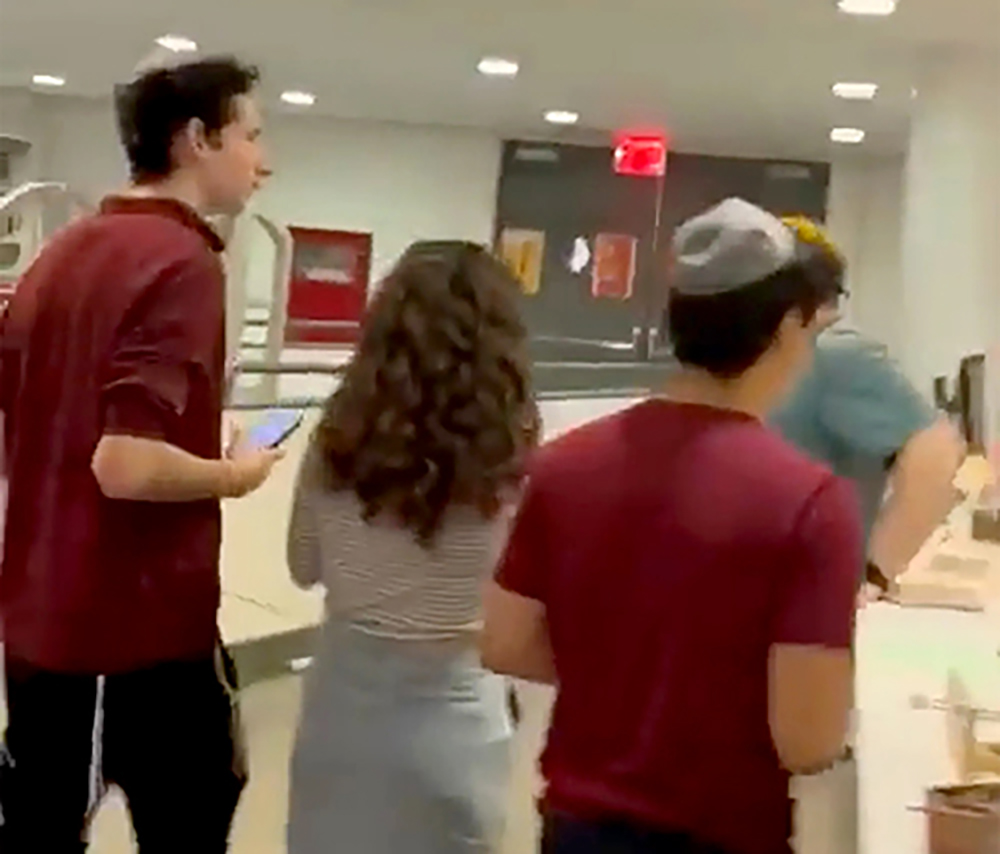|
Getting your Trinity Audio player ready...
|
Edited by: Fern Sidman
A Manhattan judge has issued a scathing rebuke of Cooper Union’s legal defense, after the college argued in court that Jewish students should have hidden from anti-Israel protesters during a volatile campus demonstration following the Hamas terrorist attack on Israel on October 7, 2023. According to a report at Vois Es Nais (VIN News), the judge made it clear that Cooper Union’s approach failed to uphold the students’ civil rights, and allowed the majority of their lawsuit under Title VI of the Civil Rights Act to move forward.
As reported by VIN News, the lawsuit stems from an incident where Jewish students were forced to take shelter inside the Cooper Union library as pro-Palestinian demonstrators gathered outside. The students, who claim the college failed to protect them from harassment and intimidation, filed a Title VI lawsuit, alleging that Cooper Union violated their rights by fostering a hostile educational environment.
During the protest, an administrator locked the library doors to prevent demonstrators from entering, but the college later suggested that the students should have fled through a back exit or taken refuge in a windowless attic instead of standing their ground. VIN News reported that the school attempted to shift the responsibility onto the students, arguing in court that they should have taken more active steps to avoid the protesters.
In a blistering 54-page ruling, Judge John Cronan rejected Cooper Union’s attempt to justify its actions. According to the information provide in the VIN News report, the judge made an explicit comparison to World War II, stating that these events took place in 2023, not 1943—a clear reference to the persecution of Jews during the Holocaust.
Judge Cronan emphasized that under Title VI, institutions are responsible for protecting students from harassment, and that the burden should never be placed on the victims to hide or flee. His ruling made it clear that Cooper Union’s response was insufficient and deeply troubling, reinforcing the claim that the school failed to protect its Jewish students from targeted intimidation.
The judge also criticized Cooper Union’s delayed and weak response in the aftermath of the protest, noting that the school initially issued only a mild statement of support for Jewish and Israeli students. It was only after significant pressure from the Jewish community that the administration released a stronger statement condemning anti-Semitism and intimidation on campus.
The court ruled in favor of the plaintiffs on the majority of their claims, allowing the case to proceed. The lawsuit argued that Cooper Union failed to uphold its responsibility under federal anti-discrimination laws, particularly Title VI of the Civil Rights Act, which requires educational institutions to ensure a learning environment free from racial, ethnic, and religious discrimination, as was detailed in the VIN News report.
The controversy has already had serious consequences for the school. Noted in the VIN News report was that former Cooper Union President Laura Sparks resigned in August 2024, following intense backlash over how the administration handled the situation.
In response to the ruling, Cooper Union issued a statement expressing confidence that the next phase of litigation would disprove the allegations. However, legal experts believe that the judge’s strong language suggests the school will face an uphill battle in court.
The lawsuit against Cooper Union is part of a wider national debate over campus safety and virulent anti-Semitism in the wake of the Israel-Hamas war, which has intensified divisions at universities across the United States.
Many Jewish students across the country have reported increased harassment, threats, and hostile classroom environments, particularly as anti-Israel protests have grown in intensity. As such, the Trump administration has made it a priority to squarely address visceral Jew hatred on college campuses.
As reported by VIN News, the legal battle between Jewish students and Cooper Union is far from over, but Judge Cronan’s ruling marks a significant step forward in holding universities accountable for protecting students from religious and ethnic harassment.
The case will now proceed to the next phase of litigation, with the plaintiffs arguing that Cooper Union’s response—or lack thereof—endangered their safety and violated their rights. Given the strong language used by the judge, legal experts believe that this case could set a precedent for how universities must respond to anti-Semitism and campus protests in the future.
As tensions on college campuses continue to escalate, the lawsuit against Cooper Union serves as a reminder of the serious consequences institutions may face when they fail to protect their students—a message that will likely resonate beyond this single case.
In a statement sent to the media last Thursday, The Lawfare Project announced that they are pleased with the decision of Judge Cronan to allow the lawsuit filed by The Lawfare Project and co-counsel Arnold & Porter Kaye Scholer to move forward.
The lawsuit, filed on behalf of 10 Jewish students, alleges that Cooper Union’s failure to adequately address the surge in anti-Semitic harassment on campus following the October 7th Hamas attack on Israel, led to an unsafe environment for Jewish students.
In its decision, the court was clear that incidents of anti-Semitic vandalism and the use of some of the slogans “went beyond mere criticism of Israeli government policy” and instead sent “a message that Jews as a class do not belong in Israel while justifying and encouraging violence against those Jews who do live there.”
The Court also found that the October 25 incident in which Jewish students were barricaded inside the school library while a hostile crowd pounded on the windows was “physically threatening or humiliating. In a pointed criticism, the Court pointed out that “These events took place in 2023—not 1943—and Title VI places responsibility on colleges and universities to protect their Jewish students from harassment, not on those students to hide themselves away in a proverbial attic or attempt to escape from a place they have a right to be.”
“We are pleased that the court has allowed our lawsuit against Cooper Union to move forward,” said Ziporah Reich, Director of Litigation at The Lawfare Project. “This case is a critical step in holding the school accountable for anti-Semitism on campus that was so severe that when Jewish students were locked in a library, fearing for their safety as an anti-Israel mob pounded on the windows trying to get in, the school instructed the police not to intervene. We are proud to stand up for our clients and send a clear message to schools that turning a blind eye to anti-Semitism will not be ignored.”




